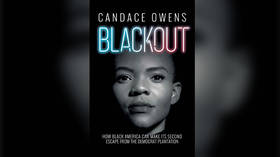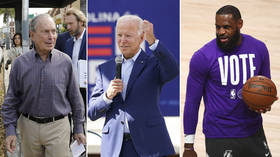Candace Owens’ first book takes a sledgehammer to Democrats, BLM, abortionists & George Floyd – but will it achieve its goal?

Blackout is a liberal sacred cow abattoir that slaughters its way through left-wing arguments about everything from police brutality to education and family values.
Candace Owens, the conservative political commentator and social media sensation, has released her first book, and it could not be timelier. The book is not subtle, as its subtitle, “how black America can make its second escape from the Democrat plantation,” suggests. It is more of a sledgehammer than a stiletto in the way it deals with Democratic arguments and their framing of American history.
The tome is unapologetically partisan in favour of the Republican Party and particularly President Trump; however, even if you do not agree with Owens’ conclusion that America’s only option is four more years of The Donald, her analysis of the facts is very difficult to dispute.
Many of the arguments will be familiar to people who have followed Owens’ rise online over the past few years (she has 2.6 million Twitter followers), but the book allows her to probe more deeply into the issues she often addresses in her viral videos.
The main thrust of her thesis is that the Democratic Party has completely failed the black community on virtually every level. She argues that the party of slavery, the Confederacy and the Klan has never been an ally of black America but has merely shifted from viewing them purely as chattels to viewing them purely as votes. This argument is provocative and, in the words of fictional figure skater Chazz Michael Michaels, will get the people going.
The book is mostly a political analysis, but Owens makes clear how her own life experiences have shaped her worldview. ‘Blackout’ is peppered throughout with references to her upbringing in Stamford, Connecticut, and specifically the influence of her grandfather. He began life as a sharecropper in North Carolina, laying out tobacco to dry out from the age of five. She recounts occasions when, in his youth, their farm was attacked by Klansmen; how his father’s drinking and philandering made him move north where he met her grandmother. Owens lived with her grandparents for a while when she was young, a time she looks back on with great fondness, and it seems to be where the bedrock of her conservative worldview was formed.
Owens lays out the problems she believes are facing the black community, and how she views the Democrats as responsible. In the chapter ‘On Family’ she details how the destruction of the black family unit and rise in single motherhood has been aided and abetted by welfare programs devised by Democrats from FDR to LBJ and, more recently, Clinton and Obama.
She also takes aim at Planned Parenthood, which she claims has been conducting a “black genocide” by administering abortions, pointing out that despite only accounting for 13 percent of the population, 40 percent of abortions are performed on black women. For good measure, she mentions that the organization’s founder, Margaret Sanger, was an avowed racist.
Most of the big political events of recent years are covered in the book, from Brett Kavanaugh’s confirmation hearing right up to the death of George Floyd in May this year. She uses the show trial that Justice Kavanaugh was subjected to as a perfect example of how modern feminism has moved from the advancement of women to the vilification of men. Owens likens the treatment of Kavanaugh following the accusations of sexual assault made by Kristine Blasey Ford, to those used by southern racists to justify lynchings of black men in the Jim Crow South.
She excoriates the popular Black Lives Matter narrative around Floyd’s death and the entire movement. With characteristic forcefulness she demolishes the narrative that Floyd was a “gentle giant” turning his life around when he died during a botched arrest in Minneapolis, pointing out his lengthy criminal record and the autopsy which indicated he had several narcotics rolling around his system. But she says none of that matters, and Floyd has become yet another black idol.
This idolatry of rappers and criminals, Owens’ argues, is yet another way the black community keeps itself down. She talks fondly of the culture of her grandfather’s generation, hard work, family values and Motown music, and damns its modern equivalent.
Owens writes: “Black culture was once something to be proud of, but it no longer is. It has disintegrated into a web of likes and complacency. It is a perpetual diagnosis of our illness, running parallel to our endless denials of the antidote: the truth.”
Her conclusion is one that flies in the face of the Robin DiAngelo’s of this world, that the ills of the black community are not the result of systemic racism and white supremacy, but that they are in fact “completely optional,” and the way out of them is to once again free themselves from the proverbial “plantation.”
She says that much of black America has been kept in an equivalent of Plato’s Cave by the Democrats, a dishonest media, and race hustling “community leaders.” She writes that black conservatives like herself, who have “seen the light,” are likely to be met with resistance by those who still believe the shadows on the wall cast by the Democratic Party that placates them with handouts rather than a hand up. The way out of this self-inflicted misery? Voting for Trump.
The book is very partisan all the way through but, as one would expect given the timing of the release, her conclusion is where it gets most to the point. Trump, whom she knows personally, is the admittedly imperfect vessel to save black America. She reiterates Trump’s question of 2016 “What have you got to lose? You’re living in your poverty, your schools are no good, you have no jobs, 58% of your youth is unemployed, what the hell do you have to lose?”
While you might not like Trump after reading Owens’ analysis, it is hard to see how pulling the lever for Biden will not just result in more of the same for the black community. We’ll see in November if Owens’ message cuts through or not.
Think your friends would be interested? Share this story!
The statements, views and opinions expressed in this column are solely those of the author and do not necessarily represent those of RT.
















